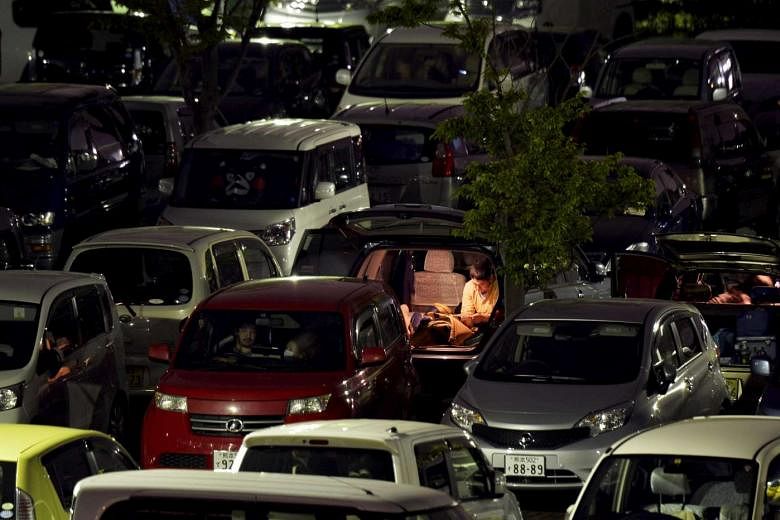TOKYO (BLOOMBERG) - Dirty toilets, a lack of running water, cramped conditions, and the fear of being trapped in a collapsing building are among the reasons why people made homeless by the fatal series of earthquakes in southern Japan are choosing to sleep in cars rather than in evacuation shelters.
One dangerous consequence is that people are increasingly being diagnosed with deep vein thrombosis, or "economy-class syndrome," from sitting in the same position for hours at a time.
As many as 97 quake refugees may be suffering from the syndrome - most of them women, and many elderly, according to Kyodo news agency.
Local media reported last week that a 51-year-old woman's likely cause of death was the blockage of a lung's artery after she spent several nights in a car following the 6.5 magnitude quake on April 14. That temblor was followed by another registering a 7.3 magnitude 28 hours later.
Seiko Yonemura, a 44-year-old care worker at a hospital in Kumamoto city near the epicentres of the earthquakes and hundreds of aftershocks, said she slept in her car with her mother and two children after the biggest quake hit. The following day, they moved into a shelter in the gymnasium at the local middle school because, she said, they were too scared to stay at home.
"At first, the shelter was extremely crowded so some people went out to sleep in the parking lot," Yonemura said. "It was hard to sleep because they kept the lights on all the time - even at night - because of concerns over people moving around if there were aftershocks. I would go to the car to get some rest in the night."
Yonemura said that her job at the hospital meant she was aware of the syndrome, and she made sure that she moved around and stayed hydrated. Not everyone took the same precautions.
"Old people, especially, didn't take enough water as they didn't want to keep going to the toilets, which had long queues and no running water," she said. "Women wouldn't drink much water for the same reason."
The earthquakes have killed 49 people, with 14 others dying from other causes following the quakes. With many homes destroyed, nearly 50,000 people are still staying at the 500 or so evacuation centers in the region.
A Mainichi newspaper survey of 50 people sleeping in cars found that 19 were doing so because they were scared to be indoors. Fifteen cited stress induced by a lack of privacy, while 14 said they were hesitant to use shelters as they had children or pets. Pets aren't allowed in shelters. More than half of them said their health had deteriorated, the paper said.
ECONOMY-CLASS SYNDROME
Deep vein thrombosis is caused when a blood clot forms in the veins that are deep in the body, often occurring in the legs, according to the Mayo Clinic. Sitting for long periods such as when driving or flying can cause the condition.
People over the age of 60 are at a higher risk, according to Mayo, and Japan has the world's fastest aging population.
A similar pattern emerged in northeastern Japan's Ishinomaki area after the huge tsunami and earthquake in March 2011. Researchers there found increased prevalence of the syndrome, according to a study published in the Annals of Vascular Diseases. The causes likely included dehydration resulting from limited water supply and prolonged immobility of the elderly in the crowded shelters, the study said.
Prime Minister Shinzo Abe said at the weekend that the government would compile an extra budget to help the recovery effort from the earthquakes.
Some have begun avoiding shelters after standards of behavior slipped, said Jay Onyskin, a 46-year-old American father of three who runs a bakery in Kumamoto with his Japanese wife. With their home was destroyed, his family is staying at a friend's house while he sleeps in the shop.
"We didn't want to stay in evacuation centres as they got pretty crowded," Onyskin said. "The first couple of days they were fine, and people were friendly, but after about the third night people started getting very territorial. They were not a place for a family of three to stay. When they put out food, old people would barge their way to pick up rice balls. There was a very 'me, me, me' mentality."

